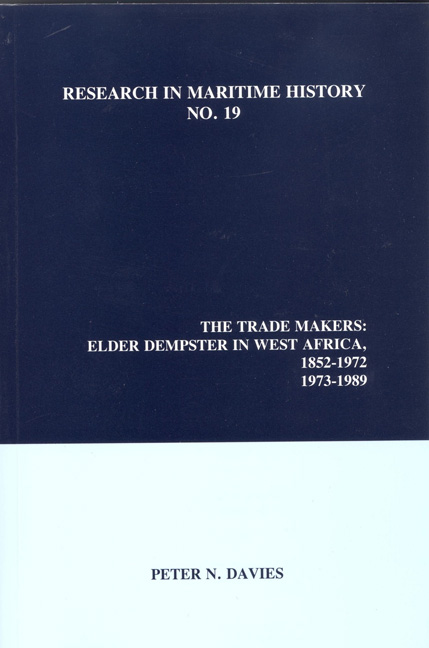Book contents
- Frontmatter
- Table of Contents
- List of Illustrations
- Foreword
- Introduction (Second Edition)
- Foreword
- Preface
- Acknowledgments
- Introduction to the Original Edition
- Frontispiece
- Part One The Pioneers
- Part Two Elder Dempster And Company
- 3 Alfred Lewis Jones
- 4 The West African Shipping Conference
- 5 Expansion and Diversification
- 6 The Effects of the Conference System
- Part Three Elder Dempster And Company Limited
- Part Four Elder Demster Lines Limited
- Part Five The End Of An Era
- List of Appendices
- Appendices
- Bibliography
- Index
4 - The West African Shipping Conference
from Part Two - Elder Dempster And Company
- Frontmatter
- Table of Contents
- List of Illustrations
- Foreword
- Introduction (Second Edition)
- Foreword
- Preface
- Acknowledgments
- Introduction to the Original Edition
- Frontispiece
- Part One The Pioneers
- Part Two Elder Dempster And Company
- 3 Alfred Lewis Jones
- 4 The West African Shipping Conference
- 5 Expansion and Diversification
- 6 The Effects of the Conference System
- Part Three Elder Dempster And Company Limited
- Part Four Elder Demster Lines Limited
- Part Five The End Of An Era
- List of Appendices
- Appendices
- Bibliography
- Index
Summary
The West African Merchants
A vital prerequisite for any understanding of the West African shipping trade is a knowledge of the West African merchants. Three major groupings of merchants developed during the nineteenth and twentieth centuries. These were the Niger Company, the Miller-Swanzy group, and the African Association, all of whom were in turn the result of previous amalgamations. There were also many other smaller firms which operated on the coast. These were usually quite small concerns, but a few reached a significant size and the most important of these was the firm which later took the title of John Holt and Company (Liverpool) Limited.
The Niger Company had originally been formed in 1879 when Captain Goldie-Taubman (later Sir George Goldie) had amalgamated the Niger interests of four British firms. Soon after it was established, the Company applied to the British government for a charter to enable it to govern as well as trade in those parts of the Niger basin where it had made suitable treaties with the local chiefs. This application was refused, as was a second attempt in 1882. The lack of a charter, plus the presence of two rival French companies, threatened the ultimate supremacy of the British firm when the “scramble for Africa” began in 1884. Fortunately the Niger Company was able to purchase both of these French firms as well as a new English competitor before the Berlin conference got under way. As a result the Niger area was accepted as a British sphere of influence, and in 1886 a charter was granted to the firm which changed its title to the Royal Niger Company, Chartered and Limited.
The charter contained many clauses which attempted to limit the monopoly of the Company, but in practice other traders quickly found that it was impossible to compete successfully. In spite of this the Royal Niger Company returned only six percent on its paid-up capital, with the exception of a single year when seven percent was paid. It did, however, continuously extend the area of its operations, and in 1897 its forces under Goldie were successful in defeating the northern Emirs who had challenged its authority for many years. The charter came to an end on the 1 January 1900.
- Type
- Chapter
- Information
- The Trade MakersElder Dempster in West Africa, pp. 57 - 78Publisher: Liverpool University PressPrint publication year: 2000

